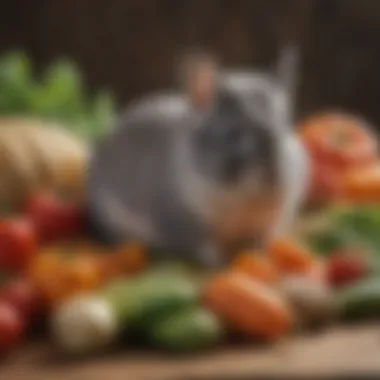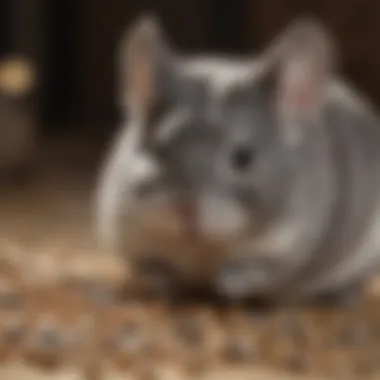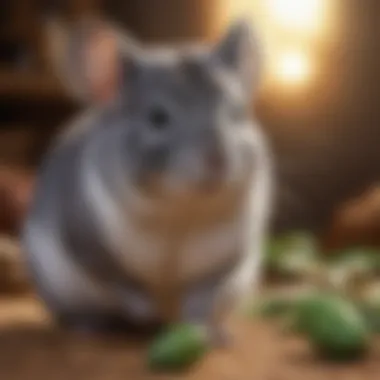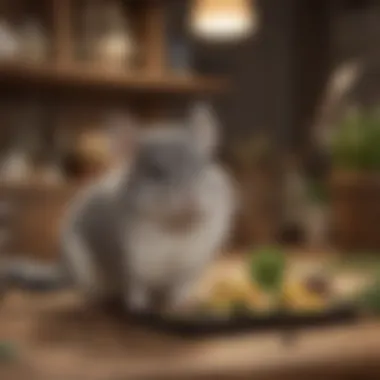Nutritional Guidelines for Chinchillas: A Complete Guide


Intro
Chinchillas are often regarded as unique pets, yet understanding their nutritional needs is crucial for their health and happiness. Many pet owners are unaware of the specific dietary requirements of chinchillas. This guide will explore essential nutrients and healthy feeding practices that can influence the well-being of these furry companions.
Understanding Your Pet
Pet Behavior Basics
Chinchillas are social and active animals. They are naturally curious and need mental stimulation. Understanding their behavior can enhance the bond between pet and owner. They communicate through various sounds, and their body language reflects their mood. For owners, recognizing signs of stress or discomfort is key to proper care.
Common Breed Characteristics
There are two main types of chinchillas kept as pets: standard chinchillas and mosaic chinchillas. Standard chinchillas are known for their soft fur and robust health. Mosaic chinchillas exhibit a unique blend of colors and patterns. While these breeds share many dietary needs, it's essential to be aware of any specific traits that may influence their health.
Species-Specific Needs
Chinchillas have unique dietary requirements. Their intestines are designed to process high fiber and low fat foods. They need plenty of hay, such as timothy hay, to support their digestive system. Additionally, chinchillas benefit from limited pellets and occasional treats that are specifically formulated for them. This balance of fiber, protein, and minimal sugars is vital.
Pet Care and Maintenance
Feeding Guidelines
The cornerstone of healthy chinchilla nutrition is a high-fiber diet. Provide unlimited access to hay. Pellets, while important, should only make up a small portion of their diet. Treats should be offered sparingly. Fresh vegetables can be an occasional addition, but it is crucial to research which ones are safe, as many are unsuitable for chinchillas.
- Hay: Unlimited access is essential.
- Pellets: Small amounts daily.
- Treats: Minimal; focus on chinchilla-safe options.
Grooming Essentials
Chinchillas require regular grooming to maintain their fur health. Their dense fur can trap dirt and debris. Brushing with a soft-bristled brush helps to keep their coat clean. Brushing also acts as a bonding activity between pet and owner.
Hygiene Practices
Maintaining cleanliness in the chinchilla's habitat impacts their overall health. Regularly clean the cage to manage waste and odors. This includes changing bedding and washing food dishes. It is vital to create a safe and sanitary environment for these pets.
Health and Wellness
Routine Vet Check-ups
Regular veterinary visits ensure that chinchillas remain healthy. A vet experienced with exotic pets can monitor their well-being. Annual exams can help prevent potential health issues.
Vaccination Needs
Chinchillas do not require the same vaccinations as dogs or cats, but protection against parasites and potential diseases is advisable. Consultation with a veterinarian will help tailor the vaccination schedule.
Recognizing Signs of Illness
Awareness of common health issues in chinchillas is crucial. Signs of problems may include changes in eating habits, lethargy, or abnormal behavior. Prompt action is essential if these symptoms are observed.
Enrichment and Activities
Indoor vs.
Outdoor Activities Chinchillas thrive in safe, stimulating environments. Indoor playtime can consist of designated exercise areas with obstacles and tunnels. Outdoor activities can be beneficial but must be supervised to prevent stress.
Interactive Toys and Games
Providing toys that encourage exploration and chewing helps mental engagement. Wooden toys and chew sticks made specifically for chinchillas are excellent options. These items promote dental health as well.
Socialization Opportunities
Chinchillas are social creatures. Spending time with them and teaching them tricks can enrich their lives. It is also vital to ensure they are comfortable and not stressed during interactions.
Proper nutrition and care can significantly enhance your chinchilla's quality of life.
Understanding Chinchilla Dietary Needs
Chinchillas, though small and often seen as simple pets, have complex dietary requirements. Understanding these needs is essential for their health and wellbeing. Proper nutrition directly influences their energy levels, fur quality, and overall lifespan. A diet lacking necessary nutrients can lead to serious health issues, making this a pivotal aspect for any chinchilla owner.


The Digestive System of Chinchillas
The digestive system of a chinchilla is unique and specialized for a high-fiber diet. They possess a monogastric digestive tract, meaning they have a single stomach, but it functions in a way that mimics more complex systems. This adaptation enables them to efficiently process large amounts of fiber while extracting vital nutrients. Understanding this aspect is critical as it shifts the focus of their diets away from sugary and fatty foods, often leading to gastrointestinal distress.
Essential Nutritional Components
A balanced diet for chinchillas is rooted in three essential nutritional components: fiber, protein, and vitamins and minerals. Each plays a crucial role in their health, influencing everything from digestion to vitality.
Fiber Requirements
Fiber is paramount for chinchillas. It promotes healthy digestion and helps prevent gastrointestinal problems, common in chinchillas. High-fiber diets ensure that the digestive system functions properly. Many owners might overlook fiber's importance, but it is often the most beneficial element in a chinchilla's diet.
Chinchillas require a daily intake of high-quality grass hay, like Timothy or Orchard Grass. These sources provide the necessary roughage, encouraging effective chewing and preventing overgrowth of their teeth. When focusing on fiber, it is crucial to remember that inadequate fiber can lead to severe health complications, such as intestinal blockages or dental problems.
Protein Sources
Protein is essential but should be carefully managed. Chinchillas require protein for growth, energy, and tissue repair. Sources such as hay and specially formulated pellets provide adequate protein levels. Higher protein can energize a chinchilla but can also lead to obesity if overconsumed. Therefore, balancing protein intake is important for maintaining optimal health.
Selecting a quality pellet specifically designed for chinchillas can aid in meeting protein requirements without overdosing. Remember that the primary source of protein should be plant-based; animal proteins can cause issues due to chinchillas’ unique digestive systems.
Vitamins and Minerals
Vitamins and minerals support overall health. These nutrients play critical roles such as in bone health, immune function, and metabolic processes. Vitamins A, D, and E, along with calcium and phosphorus, should be integrated into their diets. Many commercial chinchilla pellets contain added vitamins and minerals, but supplementation may be necessary in certain circumstances.
However, it is important to be cautious about supplementation. Over-supplying certain vitamins, particularly fat-soluble ones, can create toxicity. Proper monitoring and understanding of dietary needs will help in maintaining a healthy chinchilla environment.
Proper nutrition is the cornerstone of chinchilla health, impacting their lifespan and happiness significantly.
A thorough grasp of these dietary needs aids pet owners in tailoring appropriate diets that ensure their chinchillas thrive. Understanding the unique digestive system and nutritional components of chinchillas not only enhances their quality of life but also fosters a deeper connection between owner and pet.
Appropriate Types of Food
Choosing the right kinds of food for chinchillas is essential for their health and well-being. Different food types offer varied nutrient profiles, and it is crucial to select suitable options to meet the specific dietary needs of these rodents. In this section, we will discuss pellet formulations, hay varieties, and the inclusion of fresh vegetables and fruits in their diet.
Pellet Formulations
Pellets are an important component of a chinchilla's diet. These formulations are designed to provide a balanced mix of nutrients that chinchillas require. Unlike loose feed, pellets ensure that each bite contains the necessary vitamins and minerals. It is vital to choose high-quality pellets that are made specifically for chinchillas.
Benefits of Pellet Formulations:
- Ensures consistent nutrient intake.
- Reduces selective feeding behavior.
- Provides essential vitamins and minerals.
When selecting pellets, avoid those that contain seeds or nuts, which can lead to obesity and health issues. Look for brands that emphasize fiber content, as fiber is critical for good digestion.
Hay Varieties
Hay constitutes a major part of a chinchilla's diet and provides essential roughage. Different types of hay have varying nutritional profiles. Here, we will focus on three prominent types: Timothy Hay, Orchard Grass Hay, and Alfalfa Hay.
Timothy Hay
Timothy Hay is one of the most popular and beneficial choices for chinchillas. Its high fiber content helps maintain a healthy digestive system. This hay also supports dental health by promoting natural wear on the teeth.
Key Characteristics:
- Excellent source of fiber.
- Promotes digestive health.
- Facilitates dental wear.
The unique feature of Timothy Hay is its low protein and calcium levels, making it a suitable choice for adult chinchillas. Excess protein or calcium can lead to urinary and kidney issues.
Orchard Grass Hay
Orchard Grass Hay is another great option and offers a sweeter taste that chinchillas may prefer. It has a softer texture compared to Timothy Hay, making it easier for younger or older chinchillas to consume.
Key Characteristics:
- Soft texture for easier consumption.
- Pleasant aroma and taste.
Orchard Grass Hay provides a balance of fiber and protein. This hay is beneficial but should be mixed with other hay types to ensure balanced nutrition.


Alfalfa Hay Considerations
Alfalfa Hay is rich in protein and calcium. While it offers many health benefits, it should be given in moderation, especially to adult chinchillas.
Key Characteristics:
- High in protein and calcium.
- Can support growing chinchillas.
The unique feature of Alfalfa Hay is its suitability for young chinchillas or those that are recovering from illness. However, a diet high in Alfalfa can lead to obesity and other health issues in adults, so careful management is necessary.
Fresh Vegetables and Fruits
In small amounts, fresh vegetables and fruits can enhance the diet of a chinchilla. These items provide essential vitamins, but they should not replace hay or pellets. Proper selection is essential, as not all vegetables and fruits are safe for chinchillas.
Suitable Options Include:
- Carrots (in moderation)
- Leafy greens like kale or spinach
- Small portions of apple or pear
Overall, feeding fresh foods should be done sparingly and never as a primary food source. Providing a variety of nutrients ensures a well-rounded diet, leading to better health and longevity.
Remember: Always introduce any new food gradually to avoid digestive upset.
Foods to Avoid
Understanding what foods should be avoided in a chinchilla's diet is crucial for their health and well-being. Inappropriate food choices can lead to serious health issues, including digestive disorders and obesity. Knowing which items to exclude allows pet owners to create a balanced diet, enhancing the longevity and quality of life for their pets.
Harmful Vegetables and Fruits
Not all vegetables and fruits are safe for chinchillas. Some can be harmful due to their high sugar or fat content, while others can cause gastrointestinal distress. For instance, starchy vegetables like corn and potatoes should be completely avoided as they can disrupt the balance of a chinchilla's sensitive digestive system.
Typical harmful items include:
- Lettuce: High in water content, it can lead to diarrhea.
- Potatoes: Contain solanine, which can be toxic.
- Citrus Fruits: High acidity can upset their stomach.
- Avocado: Contains persin, which is toxic.
It's essential to be cautious and research about any new food before introducing it. Ensuring only safe options are fed will help maintain their health and prevent any adverse reactions.
Grains and Sugary Treats
Grains and sugary snacks are another category to avoid when feeding chinchillas. These items do not align well with their natural dietary needs and can have negative impacts on their health. Grains often contain too much starch, which is harmful to their digestion. Sugary treats can cause obesity and dental problems.
Examples of food types to sidestep:
- Bread: Too much starch and yeast.
- Cereals: Often high in sugars.
- Cookies and convenience snacks: Usually contain sweeteners or fats.
Instead, chinchillas should primarily consume hay and high-fiber pellets designed for their species. By avoiding these inappropriate food options, pet owners can ensure their chinchilla remains healthy and active. Remember, when in doubt about a food group, consult resources or veterinarians specialized in small animal care.
Feeding Practices and Schedules
Feeding practices and schedules are crucial for maintaining the health of your chinchilla. A structured feeding routine not only promotes proper digestion but also helps in managing weight and preventing health issues. Consistency in feeding habits fosters a sense of security for your pet, aligning their eatng schedule with their natural behaviors. It's important to understand the specific needs of chinchillas when developing the right feeding routine.
Daily Feeding Amounts
Determining the right daily feeding amounts for your chinchilla depends on various factors including age, weight, and overall health. Adult chinchillas generally require about 1/4 to 1/2 cup of high-quality pellets per day. However, hay must also make up the bulk of their diet. When feeding your chinchilla, one should offer unlimited hay as it aids in proper digestion and dental health.
Keep in mind that fresh greens and treats should be limited and provided in small quantities, about a tablespoon per day. Too many treats can lead to obesity and other health issues. Familiarize yourself with specific brand recommendations for pellets and hay to ensure quality in your chinchilla’s diet.
Frequency of Feeding
Frequency of feeding is an essential element of chinchilla nutrition. Unlike some pets, chinchillas do not thrive on frequent meals throughout the day. Instead, it's more beneficial to provide food twice daily. This allows them to have a sense of schedule without overwhelming their digestive system. Aim to give pelleted food in the morning and hay in the evening, or vice versa, depending on your schedule.
These meal times can also help you monitor their eating habits carefully. If you notice any changes in how much they eat, this can be a signal of health issues. Therefore, a consistent feeding routine is vital for chinchillas.
Monitoring Food Intake
Monitoring food intake is a significant part of responsible pet ownership, especially for chinchillas. Keeping track of how much your pet eats will help you spot any changes in appetite or behavior that may indicate a health problem. It's wise to observe their eating habits daily.
Regular checks can prevent serious health issues.


Make sure to measure the amount of pellets and hay provided each day. Notice patterns or preferences regarding food types they enjoy more, as these can shift. If you observe a decrease in appetite, it may also signal stress or illness. Discussing any sudden changes with a veterinarian is crucial for your pet’s well-being.
Hydration Considerations
Hydration is a crucial aspect of chinchilla care that often goes unnoticed by pet owners. Though these animals might seem content, proper hydration is vital for maintaining their health and well-being. Chinchillas, like all animals, require adequate water intake to support bodily functions. Without a consistent source of hydration, they are at risk for serious health issues, including dehydration and related complications.
Water Sources
Providing appropriate water sources for your chinchilla is important. You can offer water in two primary forms: bottles and bowls. Many owners prefer using water bottles, as they can control the water accessibility and maintain the cleanliness, reducing the risk of contamination.
- Water Bottles: These typically feature a metal spout that prevents spills and keeps water clean. Ensure the spout is functioning properly so that your chinchilla can easily drink.
- Water Bowls: While some owners use bowls, they can be overturned easily. However, if you choose this option, select a heavy, shallow bowl that cannot be tipped over.
It is essential to check the water daily, replacing it with fresh water every day. Pay attention to seasonal changes. In hot weather, your chinchilla may need more water due to heat stress.
Signs of Dehydration
Identifying signs of dehydration in chinchillas may seem difficult at first. However, vigilance will help you recognize and address issues promptly. Dehydration can lead to serious health complications, so knowing what to watch for is essential.
Common signs include:
- Lethargy: If your chinchilla seems less energetic than usual or is not as playful, this could indicate dehydration.
- Dry Mouth and Nose: A dry or sticky mouth and a lack of moisture in the nose are clear indicators that hydration is lacking.
- Skin Elasticity: Gently pinch the skin on the back of your chinchilla's neck. If it does not quickly bounce back, this is an alarming sign of dehydration.
- Reduced Urination: Monitor how often your chinchilla urinates. A significant decrease can show dehydration.
If you notice any of these signs, provide water immediately and consult a veterinarian for further guidance. Maintaining a proper hydration routine is not just important; it is fundamental to the overall health of your chinchilla.
Remember, hydration plays a critical role in your chinchilla's well-being. Ensure water availability and monitor for signs of dehydration regularly.
Special Dietary Needs
Special dietary needs of chinchillas are crucial for maintaining their overall health. Understanding these requirements can significantly impact their quality of life. Several factors come into play when considering the dietary adjustments necessary to cater to these special needs, particularly as chinchillas age or face specific health issues. Providing appropriate nutrition can enhance their wellbeing and longevity.
Dietary Adjustments for Aging Chinchillas
As chinchillas age, their nutritional demands change. Older chinchillas may experience reduced activity levels and slower metabolism, necessitating a shift in their diet. Here's what to keep in mind:
- Lower Caloric Intake: Older chinchillas generally require fewer calories. Overfeeding can lead to obesity, which can further complicate health issues.
- Enhanced Fiber: Maintaining high fiber intake is important because it aids in digestion. Senior chinchillas may benefit from softer, easy-to-chew hay options like orchard grass.
- Supplements for Joint Health: Some aging chinchillas develop arthritis or joint problems. Offering supplements, such as glucosamine, can be beneficial. Always discuss with a veterinarian before starting any supplement.
- Frequent Monitoring: Regular check-ups can help assess whether dietary adjustments are effective. Weight management should be a key focus.
Health Concerns and Nutritional Modifications
Certain health issues can necessitate specific adjustments in a chinchilla’s diet. Consulting with a veterinarian is essential for tailored advice but here are some common modifications based on health conditions:
- Dental Issues: Chinchillas are prone to dental problems. A diet emphasizing high-fiber hays can help prevent overgrown teeth. Fresh hay should be readily available.
- Digestive Problems: In cases of gastrointestinal stasis, veterinary support is crucial. Dietary modifications may include easy-to-digest food, such as mashed pellets, or avoiding certain greens that could worsen symptoms.
- Obesity: If a chinchilla is overweight, reduced sugary treats and more emphasis on hay and fresh greens should be considered.
It is important to provide consistent and measured feeding amounts based on individual health needs.
Common Misconceptions
Understanding common misconceptions about chinchilla nutrition is crucial for pet owners aiming to provide optimal care. Misunderstandings can lead to improper feeding practices that may impact a chinchilla's health. By addressing these myths, owners can become more informed about their pets' dietary needs, thus ensuring better overall wellbeing.
Myths about Chinchilla Nutrition
Several prevailing myths surround chinchilla nutrition that often mislead pet owners. Here are some key points that clarify these misconceptions:
- Chinchillas can eat any type of hay: While hay is essential in a chinchilla's diet, not all hays are suitable. Timothy hay is highly recommended due to its high fiber content, while alfalfa hay, though nutritious, is too rich for adult chinchillas and may lead to obesity if fed regularly.
- Chinchillas require fruits and vegetables daily: Many owners think fresh produce should be a staple in a chinchilla’s diet. However, fruits and vegetables should only be offered in moderation. Excessive sugars from these foods can lead to digestive problems.
- All commercial pellets are the same: Not all pellets cater to chinchillas. It is essential to choose high-fiber, low-protein pellets specifically formulated for chinchillas. Pellets high in grain or low in fiber can cause serious health issues.
- Chinchillas don’t need special care when feeding: Some people assume chinchillas can be fed like other small pets. In reality, chinchillas have specific dietary requirements that differ significantly from those of rabbits or guinea pigs. %Proper guidance is key to avoid health issues.
- Water is not a significant concern: It is a common assumption that chinchillas do not require much water. Yet, access to clean, fresh water is vital for hydration. Even slight dehydration can have negative effects on a chinchilla’s health.
Proper understanding of chinchilla nutrition is crucial for maintaining their health. Ignorance leads to risks that can easily be avoided.
By debunking these myths, chinchilla owners can foster a more conducive environment for their pets. This understanding helps in making informed choices that support the chinchilla's health and wellbeing. Recognizing the truth behind these common misconceptions can ultimately enhance the care provided to these unique animals.
Culmination
The importance of understanding nutritional guidelines for chinchillas cannot be overstated. This article serves as a comprehensive resource for pet owners wanting to ensure optimal health and well-being for their chinchillas. Understanding the dietary needs of these animals enables caregivers to make informed decisions when it comes to feeding practices.
Chinchillas, with their unique digestive systems, require specific nutrients that differ from many other pets. It is vital to recognize that the quality of food impacts their health directly. Over time, inappropriate feeding can lead to serious health issues.
In this article, we've covered key points such as the essential nutrients, suitable food types, and harmful items that should be avoided. Additionally, we looked at feeding practices and hydration considerations. The importance of monitoring food intake and being aware of signs of dehydration is also crucial for maintaining chinchilla health.
"A balanced diet is essential to promote longevity and vitality in chinchillas."
By prioritizing proper nutrition, pet owners can contribute to longer, healthier lives for their furry companions. It is not just about keeping them alive but ensuring they thrive. Small adjustments in their diet can lead to significant improvements.
Recap of Key Nutritional Points
Chinchillas thrive on a diet high in fiber but low in fat and protein. Here are the essential points to remember:
- Fiber is Crucial: A diet rich in hay ensures their digestive system remains healthy.
- Pellets: Use high-quality chinchilla pellets that complement hay, ensuring adequate vitamins and minerals.
- Fresh Produce: Introduce small quantities of fresh vegetables and fruits, but do so very cautiously to avoid digestive upsets.
- Avoid Certain Foods: Steer clear of foods high in sugar and fat as they can harm chinchillas.
- Hydration: Ensure fresh water is always available and monitor for dehydration signs.







